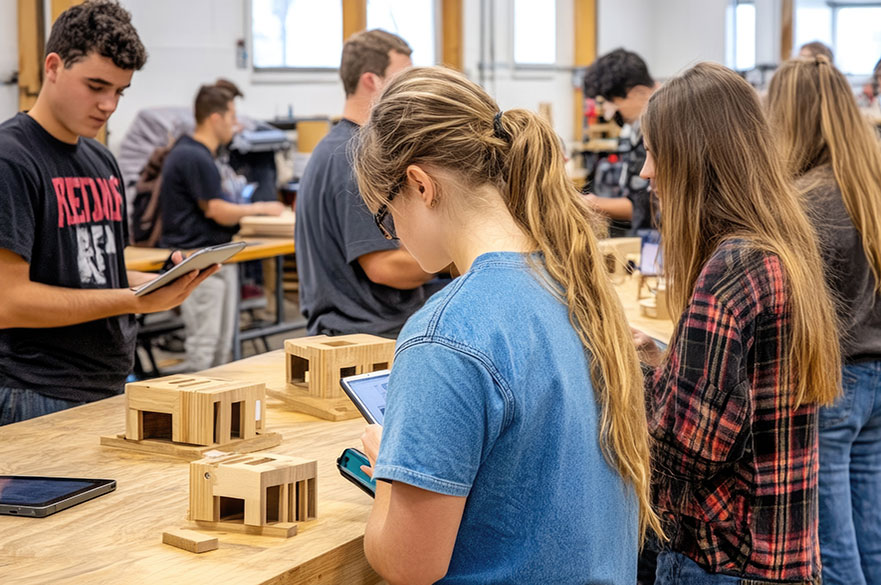Expert blog: Design and Technology education at a crossroads - crisis, opportunity, and the path forward
By Helen Breese | Published on 8 January 2025
Categories: Press office; Research; Nottingham Institute of Education; School of Social Sciences;

In 1992, Design and Technology (D&T) was a compulsory subject at GCSE. Yet today, it trails behind religious studies, business studies, and geography, with some schools merging it with art classes or dropping it entirely.
This dramatic decline isn't just about numbers – it represents a critical threat to how we prepare young people to engage with and shape our increasingly technological world.
D&T education in schools has faced mounting challenges since its formal inception in England and Wales in 1992. At its heart lies a fundamental question that still haunts the subject: what exactly is D&T for, and why does it matter?
The challenges facing D&T education can be viewed through three distinct but interconnected lenses: how we define the subject, how policies shape its place in education, and the practical realities schools face on the ground.
At its core, D&T has faced fundamental questions about its identity and purpose. This uncertainty extends to an ongoing tension: should D&T be viewed as a more vocational subject, as it is in countries like Taiwan and Sweden, or as part of a general education that serves all students?
In England, its place in primary education suggests the latter, supporting my argument that D&T enables young people to participate in our democracy through understanding technological systems and their impacts, from AI to the lifecycle of mobile phones.
These identity challenges have been compounded by systematic policy decisions. Most notably, the 2011 changes to performance measures effectively sidelined D&T, pushing it outside core metrics. This policy shift has had far-reaching consequences, diminished the subject's status, and limited access for high-achieving students.
The irony is striking - while organisations like the Design Council emphasise D&T's importance for industry and innovation, education policy has moved in the opposite direction.

These systemic issues have created very real challenges at the school level. Schools face a perfect storm of difficulties: chronic trainee teacher recruitment problems - recruitment targets for D&T have not been met for at least the last six years and in 2024/25 only 40% of the target was met - shrinking departmental budgets, and declining GCSE enrolment numbers (280, 670 in 2009 to 80,580 in 2024).
In response, many schools have reduced their D&T offerings, while others have taken the concerning step of merging D&T with Art and Design – despite these subjects' distinct differences and learning outcomes. While this may seem like a practical solution, it risks further diluting the unique value each subject brings to education.
Despite these layered challenges, we're at a potential turning point for D&T education. The current Curriculum and Assessment Review offers a rare opportunity to reshape the subject's future – not just by addressing individual problems, but by fundamentally reconsidering its place in 21st-century education.
Several promising initiatives are already underway. The Department for Education's call for evidence last autumn created a platform for diverse voices – from classroom teachers to industry leaders – to articulate both the challenges facing D&T and potential paths forward. While we await the panel's analysis of these responses, subject associations haven't stood still. They've been actively working to raise awareness of these challenges and propose practical solutions.
For example, the Design & Technology Association has launched their Inspired by Industry initiative, which provides free teaching resources that connect classroom learning to real-world applications. These materials have been downloaded over 3,000 times across twelve units, helping teachers develop new approaches to teaching at Key Stage 3.
The Association has also been collaborating with organisations like the IET on their Engineering Kids' Futures campaign to help redefine how engineering and design are presented to young learners. Meanwhile, other groups like NSEAD have developed the Big Landscape curriculum toolkit to help teachers improve and contemporize their teaching approaches, with a particular focus on making the curriculum more relevant to today's learners.
However, I believe we need to broaden the conversation beyond schools alone.
At Nottingham Trent University, we recognise that higher education has a crucial role to play in this dialogue. As educators of the next generation of designers, technologists, and innovators, universities bring valuable perspective to these discussions. We've already taken steps to amplify higher education's voice in the curriculum review process, but we see this as just the beginning.
This is why, along with colleagues from University of the Arts London, we're bringing together key stakeholders from across the educational spectrum later this month. This landmark design education event will unite representatives from schools, universities, and national organisations to forge a collective vision for the future of design education.
By bridging the gap between different educational sectors, we aim to create more coherent and effective pathways for students – from their first design projects in primary school through to their emergence as professional designers and innovators.
Join us for this crucial conversation about the future of design education. On Friday 24 January 2025, from 11:30am to 2:30pm at Nottingham Trent University, we're bringing together educators, awarding bodies, and design education organisations to shape the next chapter of design education in England.
Whether you're from a school, university, or design organization, your voice matters in this discussion. We'll explore how schools and universities can better align their approaches, discuss responses to the DfE Review, and begin planning future research collaborations.
Spaces are limited to ensure meaningful dialogue. Register your interest to be part of this landmark event
Notes for Editors
Press enquiries please contact Helen Breese, Public Relations Manager, on telephone +44 (0)115 848 8751, or via email.
About Nottingham Business School at Nottingham Trent University
Nottingham Business School (NBS) at Nottingham Trent University (NTU) is a leader in experiential learning and personalisation of business, management and economics education and research, combining academic excellence with positive impact on people, business and society. NBS has an unrivalled level of engagement with business, public and voluntary organisations. With more than 8,500 students, NBS is also one of UK’s largest business schools.
NBS is triple crown accredited by EQUIS, AACSB, and AMBA as well as EFMD BA for International Business, which are globally recognised hallmarks of excellence and quality for business education. NBS is also accredited by Small Business Charter, providing support and development for SMEs. The school is also a PRME Champion and held up as an exemplar and beacon by the United Nations Principles of Responsible Management Education (PRME).
About Nottingham Trent University
Nottingham Trent University (NTU) has been named UK ‘University of the Year’ five times in six years, (Times Higher Education Awards 2017, The Guardian University Awards 2019, The Times and Sunday Times 2018 and 2023, Whatuni Student Choice Awards 2023) and is consistently one of the top performing modern universities in the UK.
It is the 3rd best modern university in the UK (The Times and Sunday Times Good University Guide 2023). Students have voted NTU 1st in the UK for student employability (Uni Compare 2025)
NTU is the 5th largest UK institution by student numbers, with over 40,000 students and more than 4,400 staff located across six campuses. It has an international student population of almost 7,000 and an NTU community representing over 160 countries.
NTU owns two Queen’s Anniversary Prizes for outstanding achievements in research (2015, 2021). The first recognises NTU’s research on the safety and security of global citizens. The second was awarded for research in science, engineering, arts and humanities to investigate and restore cultural objects, buildings and heritage. The Research Excellence Framework (2021) classed 83% of NTU’s research activity as either world-leading or internationally excellent.
NTU was awarded GOLD in the national 2023 Teaching Excellence Framework (TEF) assessment, as it was in 2019.
NTU is a top 10 for sport (British Universities and Colleges Sport league table 2023).
NTU is the most environmentally sustainable university in the UK and second in the world (UI Green Metric University World Rankings, 2023).